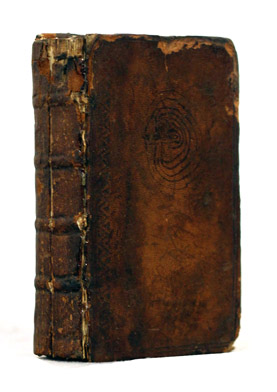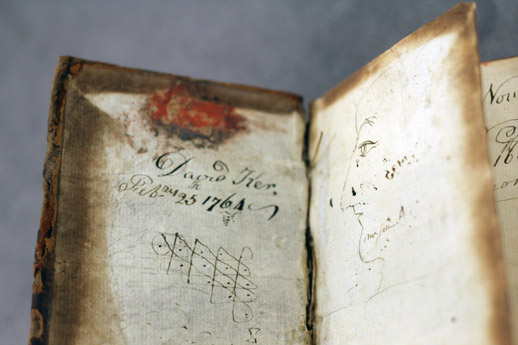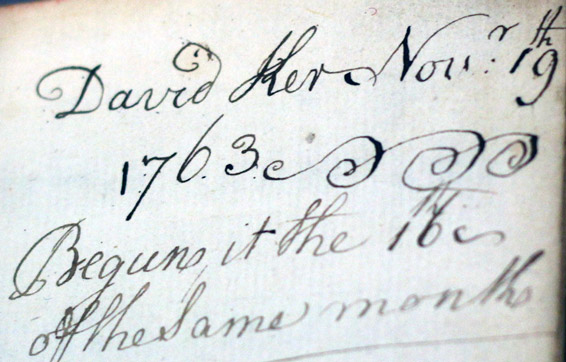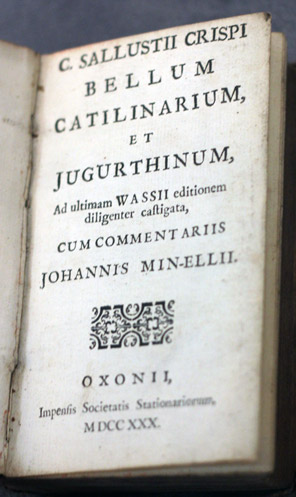Title: Bellum Catilinarium, Et Jugurthinum: Ad Ultimam Wassii Editionem Diligenter Castigata, Cum Commentariis Johannis Min-ellii / Catiline Conspiracy/War & Jugurthine War
Author: Gaius Sallustius Crispus
Publisher: Societatis Stationariorum, Oxford, 1730. Extremely rare.
Condition: Hardcover, leather. Badly beat up, fragments pieced back together, but can be read. Interior is very clean. Pocket-sized: quite small. Contains an inscription from 1763.
All text is in Latin.
About the author (from wikipedia):
Gaius Sallustius Crispus, usually anglicised as Sallust (/ˈsæləst/; 86 – c. 35 BC) was a Roman historian, politician, and novus homo from a provincial plebeian family. Sallust was born at Amiternum in the country of the Sabines and was a popularis, opposer of the old Roman aristocracy throughout his career, and later a partisan of Julius Caesar. Sallust is the earliest known Roman historian with surviving works to his name, of which we have Catiline’s War (about the conspiracy in 63 BC of L. Sergius Catilina), The Jugurthine War (about Rome’s war against the Numidians from 111 to 105 BC), and the Histories (of which only fragments survive). Sallust was primarily influenced by the Greek historian Thucydides and amassed great (and ill-gotten) wealth from his governorship of Africa.
About the The Conspiracy of Catiline:
The Conspiracy of Catiline (Sallust’s first published work) contains the history of the memorable year 63. Sallust adopts the usually accepted view of Catiline, and describes him as the deliberate foe of law, order and morality, and does not give a comprehensive explanation of his views and intentions. (Note that Catiline had supported the party of Sulla, which Sallust had opposed.) Mommsen’s suggestion—that Sallust particularly wished to clear his patron (Caesar) of all complicity in the conspiracy—may have contained some truth.
In writing about the conspiracy of Catiline, Sallust’s tone, style, and descriptions of aristocratic behavior show that he was deeply troubled by the moral decline of Rome. While he inveighs against Catiline’s depraved character and vicious actions, he does not fail to state that the man had many noble traits, indeed all that a Roman man needed to succeed. In particular, Sallust shows Catiline as deeply courageous in his final battle.
This subject gave Sallust the opportunity to show off his rhetoric at the expense of the old Roman aristocracy, whose degeneracy he delighted to paint in the blackest colours.
The work probably was written between 44 and 40 BC, or between 42 and 41 BC according to Der Kleine Pauly. However, Louis MacKay proposed a different dating. According to him, The Conspiracy was prepared by Sallust in 50 BC as a political pamphlet, but was not published; after the Civil War Sallust reviewed and finally published it.
The work does not have any traces of personal experience, and the most common explanation is Sallust’s military service during this period. The main source for this work is De Consulatu Suo by Cicero.
About the Jugurthine War:
Jugurthine War is a brief monograph recording the war against Jugurtha in Numidia from c. 112 BC to 105 BC. Its true value lies in the introduction of Marius and Sulla to the Roman political scene and the beginning of their rivalry. Sallust’s time as governor of Africa Nova ought to have let the author develop a solid geographical and ethnographical background to the war; however, this is not evident in the monograph, despite a diversion on the subject, because Sallust’s priority in the Jugurthine War, as with the Catiline Conspiracy, is to use history as a vehicle for his judgement on the slow destruction of Roman morality and politics.





